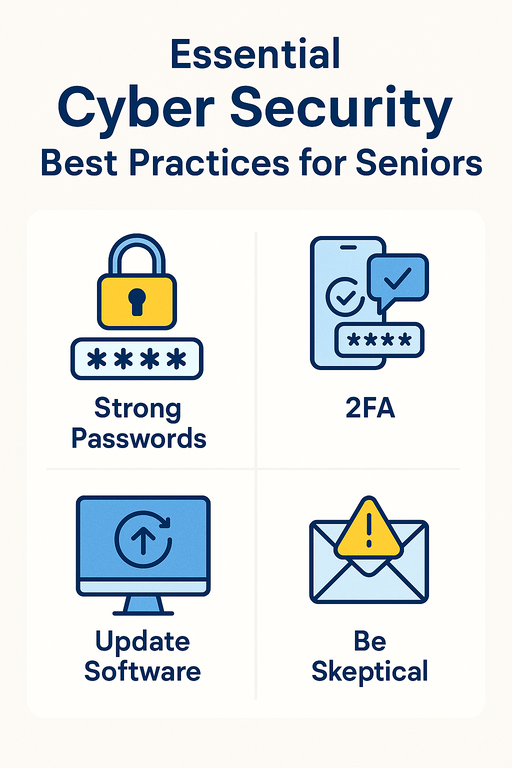The Evolving Landscape: AI in Cybersecurity and Beyond
The world of cyber threat is constantly changing, with malicious actors leveraging sophisticated tools to target individuals. A significant trend highlighted by experts, including insights from organizations like IBM, is the increasing role of AI in cybersecurity. Artificial intelligence isn’t just for sci-fi movies anymore; it’s being used by both cybercriminals to create more convincing scams and by security professionals to defend against them.
This means that while AI can help detect unusual activity in your bank account, it can also power highly personalized phishing emails that are incredibly difficult to spot. Staying informed about these advancements is a crucial part of internet safety advice for older adults. It’s no longer just about recognizing obvious scams, but understanding the subtle ways technology is being used to deceive.
Essential Cyber Security Best Practices for Seniors

Protecting your digital life doesn’t require a computer science degree. By adopting a few fundamental cyber security best practices, seniors can significantly reduce their vulnerability to common online dangers. Think of these as your personal digital shield.
- Strong, Unique Passwords: This is the bedrock of online security. Use long, complex passwords (at least 12 characters, mixing letters, numbers, and symbols) for every account. Never reuse passwords. Consider a reputable password manager to keep track of them.
- Two-Factor Authentication (2FA): Whenever possible, enable 2FA on your accounts. This adds an extra layer of security, often requiring a code sent to your phone in addition to your password. Even if criminals get your password, they can’t get in without your phone.
- Be Skeptical of Unsolicited Communications: Many online fraud attempts begin with an unexpected email, text, or phone call. If it seems too good to be true, asks for personal information, or pressures you to act quickly, it’s likely a scam. Always verify the sender through an independent source, not by clicking links in the message.
- Regular Software Updates: Keep your operating system, web browsers, and all applications updated. Updates often include critical security patches that protect against newly discovered vulnerabilities.
- Secure Wi-Fi Networks: Be cautious when using public Wi-Fi. It’s often unsecured, making it easier for others to intercept your data. Use a Virtual Private Network (VPN) for extra protection when connecting outside your home.
- Backup Your Data: Regularly back up important files, photos, and documents to an external hard drive or a secure cloud service. This ensures you won’t lose precious memories or vital information in case of a cyberattack.
- Understand Phishing and Vishing: Phishing (via email) and vishing (via phone calls) are common cyber threat tactics. They impersonate trusted entities (banks, government agencies, tech support) to trick you into revealing sensitive information. Always verify requests independently.
Navigating the Digital Landscape: Practical Internet Safety Advice

Beyond specific cyber security best practices, adopting a mindful approach to internet safety is key. Your vigilance is your first line of defense against online fraud and other digital dangers.
- Protect Personal Information: Be very selective about what personal information you share online, especially on social media. Criminals can piece together details from various sources.
- Verify Websites and Links: Always check the URL of a website before entering personal information. Look for “https://” at the beginning (the ‘s’ means secure) and a padlock icon. Be wary of shortened links.
- Recognize Red Flags in Emails/Texts: Typos, urgent demands, generic greetings, and suspicious attachments are common signs of phishing attempts. If in doubt, delete it.
- Educate Yourself Continuously: The world of online security is always evolving. Regularly read reputable sources (like consumer protection sites or cybersecurity blogs) to stay informed about new scams and threats. For example, understanding [How to Reduce Your Energy Bill]([LINK para “How to Reduce Your Energy Bill”]) might seem unrelated, but managing your digital footprint is as crucial as managing household expenses.
- Consider Identity Theft Protection: For an added layer of peace of mind, identity theft protection services can monitor your personal information and alert you to suspicious activity.
Staying Ahead: Cybersecurity in 2025 and Beyond for Seniors
The cybersecurity landscape of 2025 and beyond will continue to present new challenges, but also new tools for protection. As AI in cybersecurity evolves, so too will the methods of cybercriminals. Staying one step ahead involves not just reacting to threats, but understanding the underlying trends. This might include recognizing deepfakes used in scams or understanding how your smart home devices could be vulnerabilities.
Your digital life is an extension of your real life, and it deserves the same level of care and protection. By embracing cyber security best practices and remaining aware of the evolving cyber threat landscape, seniors can enjoy the full benefits of the internet with confidence and peace of mind. Your proactive approach to internet safety ensures your retirement remains secure and truly free.
👉 Read also: Essential Car Insurance Savings Tips for Drivers Over 50
Por exemplo, entender [como reduzir sua conta de energia] ([link para “como reduzir sua conta de energia”]) pode parecer não relacionado, mas o gerenciamento de sua pegada digital é tão crucial quanto o gerenciamento de despesas domésticas.





